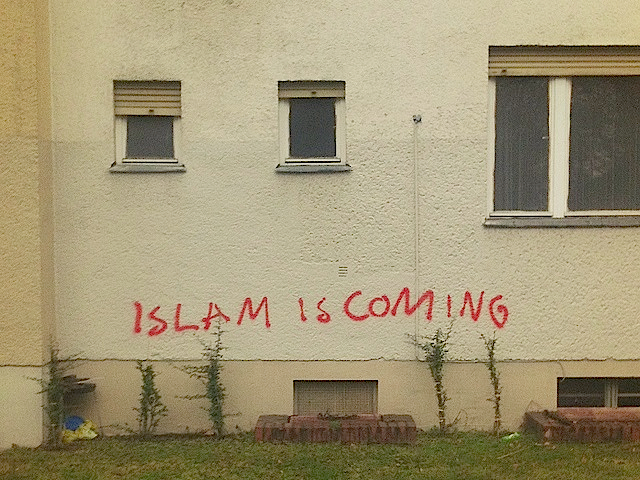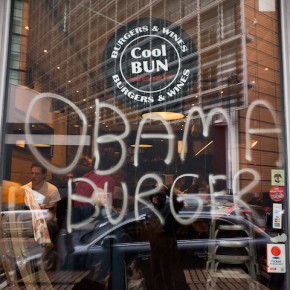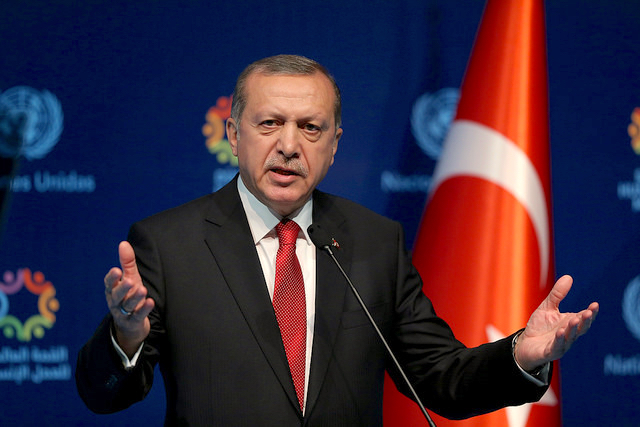Germany’s biggest tabloid has been roundly criticized for publishing an op-ed decrying Islam as a barrier to integration. Bild editor-in-chief Kai Diekmann has since apologized for the article, penned by Bild am Sonntag vice editor-in-chief Nicolaus Fest. But not before his polemic helped reinvigorate German Islamopobia, and renewing anxiety about diversity in Europe.
For those familiar with the German press, the Bild editorial was in keeping with the tabloid’s bad politics. Center-right, it is often accused of promoting the sorts of reactionary politics that flirt with the worst parts of German history.
Fest’s article, however, took the newspaper’s conservatism to a new extreme, placing it squarely in the populist nexus of Marine Le Pen and Geert Wilders. That makes it a great opportunity to study the growth and popularity of Islamophobia in Germany, today, and the challenges it poses to diversity advocacy in the immigrant-hungry country.
The editorial is actually quite short. Fest doesn’t make arguments that are particularly original. His piece makes a few criticisms of Islam which express his disgust with the religion, writ large. Its generality does a good job at summarising the core arguments of European Islamophobia, typically offered in populist circles outside Germany. The manner of the presentation is firmly in keeping with BILD’s tabloid sensibilities. Readers are clearly supposed to find someone who shares their unsubstantiated prejudices, and then praise Fest for “telling the truth.”
Fest begins by placing himself in the tradition of more sophisticated anti-Muslim atheists like Richard Dawkins, and Sam Harris. While he rejects religion overall, Fest localizes much of his distaste in Islam, specifically: “I am an atheist who is friendly to religion. I believe in no God, but Christianity, Judaism, or Buddhism do not bother me. Only Islam bothers me more and more.” We have all heard statements like this before. The argument is familiar to European populists. While other religions can function in the secular nation-state, Islam is different. Muslims cannot live in multicultural democracies, because their religion is inherently violent and anti-modern, and thus, cannot peacefully coexist alongside other faiths.
This is nonsense, of course. Islam isn’t inherently anything. It has no definite character that can be talked about in monolithic terms. Still though, the argument is fiercely political, and appeals to a broad spectrum of Europeans, including liberals. Since Muslims are not as integrated into European society as they could be, they constitute a barbarous and uncivilized abstraction. Fest gives voice to this point of view when he says that he is “bothered by forced marriages, Friedensrichter (German “shariah councils,” basically), honor killings.” I know many people in the Muslim diaspora who are skeptical of integration, since they think it means diluting ourselves until we become Western Christians. There is a lot of discussion to be had about how we change in non-Muslim countries, surely. But the fact is that it is much easier for our potential allies to hate people that they don’t actually know than it is for us to assimilate, culturally.
It’s intriguing that when Fest trots out European values, they have been retrofitted to accept social changes that they previously held in contempt. Sentences like this are wild: “What bothers me is Islam’s ready and homicidal contempt for women and homosexuals.” Women? Homosexuals? Since when is BILD a champion of gender equality? Still, it is an argument that right-wing extremists have been making all over Europe. Witness the Britain First “raid” on a London mosque where three people are recorded yelling at an elderly man to stop gender-segregating his congregation. It’s no different than the English Defense League rooting for Israel.

Demonstrations of sympathy, for the hard won-gains of the twentieth century left, are a core element of populist strategy. Particularly when it comes to matters of immigration, and cultural diversity. The former can be motivated to justify discriminating against the latter. This is obviously easier when people are already inclined to believe that Islam is inherently conservative and anti-modern. The artificial division between Muslims and progressive Europe is what is inspiring Fest when he says “I don’t need imported racism, and whatever else Islam is, I also don’t need.”
Just one example of this trend is Marine Le Pen “modernizing” the National Front. Shortly after taking over in 2011, she announced a policy of dédiabolisation, rebranding the party for mainstream French politics. Le Pen has tried very hard to purge the National Front’s image of her father‘s chauvinism and anti-Semitism. This strategy has not convinced French minorities, but it has done very well in other demographics. Nonna Mayer argues that the National Front’s recent electoral victories can almost entirely be explained by growth in the allegiance of working-class women. By turning xenophobia into a feminist issue, and downplaying her own party’s historic efforts to push back against feminist gains, Le Pen has managed to close a visible gender gap in the National Front’s support base. While only 13% of women in routine non-manual professions (mainly shopkeepers and sales representatives) voted for Jean-Marie Le Pen in 2007, that number shot up to 30% when she placed third in the 2012 presidential elections.
Fest says “anti-Semitic pogroms” bother him, reflecting the conservative belief that Muslims are the primary engines of anti-Semitism in today’s Europe. Newsweek recently published a cover article by the Budapest based Jewish journalist Adam LeBor that subtly makes this same argument. LeBor spends much of the cover story linking recent anti-Semitic attacks in France and Germany, in the wake of current Israeli military operations in Gaza, with a shift in global Muslim identity brought on by events such as the Iranian Revolution. He quotes typically reactionary sources, including CRIF‘s Roger Cukierman, who tells the reporter that “jihadism has become the new Nazism.” This isn’t “Islam is the new Nazism.” Jihadism is not Islam. However, when the Islamophobic idea is that jihadism is an inevitable result of being Muslim, the distinction is meaningless to large numbers of people. “Islam” and “jihad” are synonyms for many people, and the semantics here become a strategy for making anti-Islam statements in the mainstream.
It does make sense that Cukierman would do this. Muslim-Jewish racism is a real problem in his native France, though it has been overstated by members of both communities. The increasingly religious nature of the conflict in Palestine unfortunately nurtures this animosity on a global scale, and France is rare for hosting Europe’s largest Jewish and Muslim communities. However, when the issue is described this crudely, it ends up giving ammunition to people who are terrified at the idea of a Muslim Europe. The tragedy is that it also empowers far-right groups who are the real cause for anti-Semitic alarm. Marine Le Pen has recently clashed with her father over anti-Semitic comments, and has tried very hard to shield the National Front from accusations of hating Jews. Many conservative French Jews aren’t fooled, but are allying with her anyway in the belief that “the enemy of my enemy is my friend,” with the real threat being Muslims.
Unfortunately, Le Pen’s Jewish supporters fail to realize that many arguments about Muslims not being able to integrate in Europe, and having no place there, are remixing anti-Semitic discourse. Fest says that he doesn’t think religion itself is always a barrier to integration, but “when it’s Islam, probably yes.” He could have just as easily said the same thing about German Jews. One of the main talking points used against Jews for much of the modern era was that since Judaism is a culture and social system as well as a religion, it cannot be fully integrated within European identity and institutions.
The War on Terror has provided an opportunity to resurrect such prejudices, primarily exchanging Muslims for Jews. Islamophobia operates on the same channels as officially-condemned anti-Semitism. As a result, these arguments are being preserved at the same time that they are levied against an alternative Other. The short-term problem is that Muslim anti-Semitism is being used as a justification for Islamophobia. The long-term issue is that by doing this, the stage is being set to reintroduce traditional anti-Semitism, focused on Jewry. In seeking to forestall that crisis, conservatives like Cukierman lend their imprimatur to a trend that could very well target his own community.
None of this is inevitable. Whenever journalists like Nicolaus Fest write articles like this, there is always enough of a backlash to remind us that Islamophobia is not universally accepted. Sure, there have been some articles supporting him, but most German pundits have reacted to Fest with characteristic annoyance and dismissal. For Islamophobia to be pushed back, though, we have to be aware of what its beliefs consist of, and to remind those who use indulge it, like Fest, that they are indulging the same prejudicial reflexes as those once found amongst the Nazis.
Photographs courtesy of James Dennes and Andy Hay. Published under a Creative Commons License.





